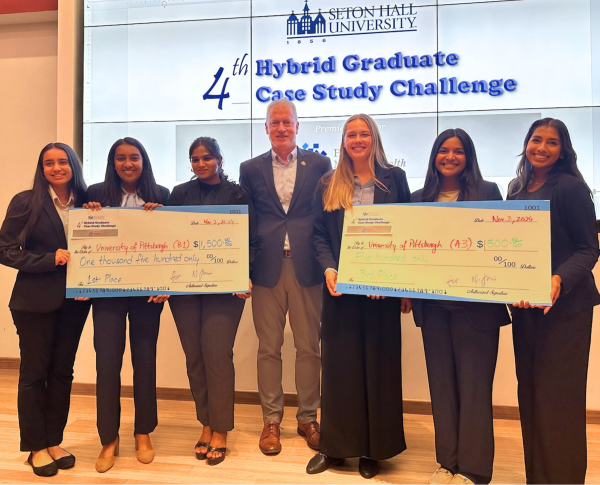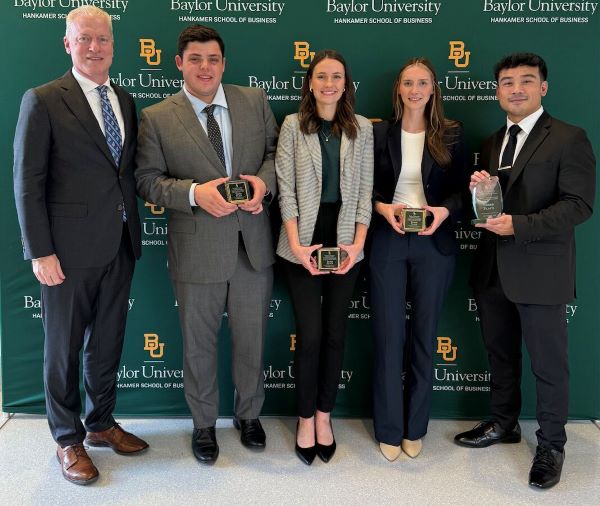Throughout the year HPM students are busy working on assignments and projects for classes, their residencies and practicum and more. Some students take on an additional challenge for a chance to both improve and show off their skills by taking part in a case competition.
These competitions encourage and support the continued professional development, allow students to develop their competencies while competing directly against students from many of the other top graduate programs from around the country. During the fall semester, three HPM teams have finished competitions on the winner’s podium.
The HPM team of Neeharika Balaji (MHA ’26), Stuti Kapadia (MHA ’26) and Sarah Siddiqui (MPH ’25) took home the top prize in their division at Seton Hall’s Graduate Case Study Competition, all three members’ first competition. “I think some part of me still can’t fully grasp that we placed and actually won. It made me realize why some people are competitive. The high of winning can be addictive,” said Kapadia.

“This was such an exciting journey for me from start to finish,” said Balaji. “From determining our strategy, to finding a solution, which I found to be the most fun, then presenting and feedback, winning felt like launching a rocket and nailing it on the very first try!”
Members from all three teams agree a major component of their success was thanks to teamwork and tackling the problem with a multi-disciplinary approach.
“My team members were incredible throughout this process,” said Siddiqui. “I was so lucky to be able to work with them for this competition. Everyone brought a new perspective and that really helped us create a strong presentation.”
The team of Lauren Brown (MHA ’25), Gabe Riberi (MHA ’25) and Chloe Schur (MHA/MBA ’26) finished third at the 8th Annual Robbins Case Competition in Healthcare Management hosted by Baylor University.
“I was excited for the opportunity to represent the University of Pittsburgh and put my knowledge and skills to the test,” said Riberi “I’d be lying if I said there was not an element of stress motivating me to put my best foot forward in Waco.”

Unlike other competitions, where teams are given scenarios prior to arrival and time to work, teams going to Baylor are given a vague framework ahead of time and only get the details after arriving, giving them just over 12 hours to work.
“A big takeaway from this competition was the importance of teamwork in high-pressure situations and trusting in the strengths of your teammates,” said Schur. “We knew each other's strengths and weaknesses, which allowed us to play to our individual strengths.”
“We leveraged our individual strengths, communicated openly, and managed the quick turnaround well,” said Brown. “Presenting was the only individualized component of the competition, which made me nervous, but the support and feedback from Dr. Broom any my teammates made all the difference.”
Being given the scenario ahead of time doesn’t make the work easier for teams though, as students who competed at Seton Hall will said, but it does help having time for feedback.
“The project details and goals were intentionally vague, leaving us to define our own strategic direction,” said Swetha Ramkumar (MPH ’26). “The independence was liberating, but it initially made finding a starting point difficult too. Once we settled on a strategy, the project began to take shape like a puzzle, with pieces methodically falling into place.”
“A few days before leaving we presented to Dr. [Kevin] Broom and some of our alumni to get their feedback and critiques,” said Natalya Temple (MHA ’26). “Going over the presentation and having an idea of what the judges would ask help settle our nerves.”
Ramkumar and Temple, along with teammates Akanksha Choudhary (MHA ’26) were one of the two HPM teams who traveled to New Jersey for the Seton Hall competition, taking third place in their division, while learning things they say will help them in their careers.
“I learned to keep an open mind, and I was forced to get over my fear of public speaking,” said Choudhary. “After presenting the first time, I tapped into my inner ‘lion’, and it ended up being really fun for me to present the ideas we came up with.”
“Embracing failure, and learning from it is crucial,” adds Ramkumar. “Our team rehearsals showed areas for improvement that we worked on and that helped us succeed.”
While the focus of the competitions is health care management, competitors say they also had to perfect skills they will need regardless of what comes next.
“One of the biggest lessons for me was to being overprepared is always better than being underprepared,” said Kapadia. “There’s a difference between knowing the material and acting like you do, and the judges see that.”
With more opportunities to take part in a case competition coming up, members of all three teams encourage others in their cohort who are thinking about it to take the chance and compete. ‘I honestly think everyone should try participating in a case competition at least once,” said Balaji.
“Go for it,” added Siddiqui. “This was my first time participating, and it was such a great way to apply the skills that we learn in the classroom. There are so many people –– peers, faculty, and alumni –– who are here to support you throughout the process.”
“Be ready to work hard, but also take everything with a grain of salt. It is meant to be a fun as well as a learning experience,” said Choudhary.
The team of Brown, Riberi and Schur, all second-year students, say the work they’ve done in the classroom and outside of it in their respective residencies allowed them to bring both book and practical knowledge to their presentation. “My extended administrative residency, where I have immersed myself in health care administration of a globally recognized healthcare system, prepared me to use real world experiences to solve the problems we faced,” said Riberi.
“Completing my first year of the program made me feel well-equipped,” said Brown. “The time constraints really put our skills to the test, and it was impressive to see my teammates' growth and how their diverse experiences in their residencies and in the classroom strengthened our team.”
Schur, an MHA-MBA joint degree student on a three-year track, attended the Baylor competition last year as an observer, a student who accompanies the team but doesn’t compete. After a third place finish this year as a competitor, she says now, the challenge is improving on the result. “In my first year, I got a taste of what to expect. This year we learned what it takes to succeed and that makes me hungrier to go for the win next year,” she said.
-Mike Friend